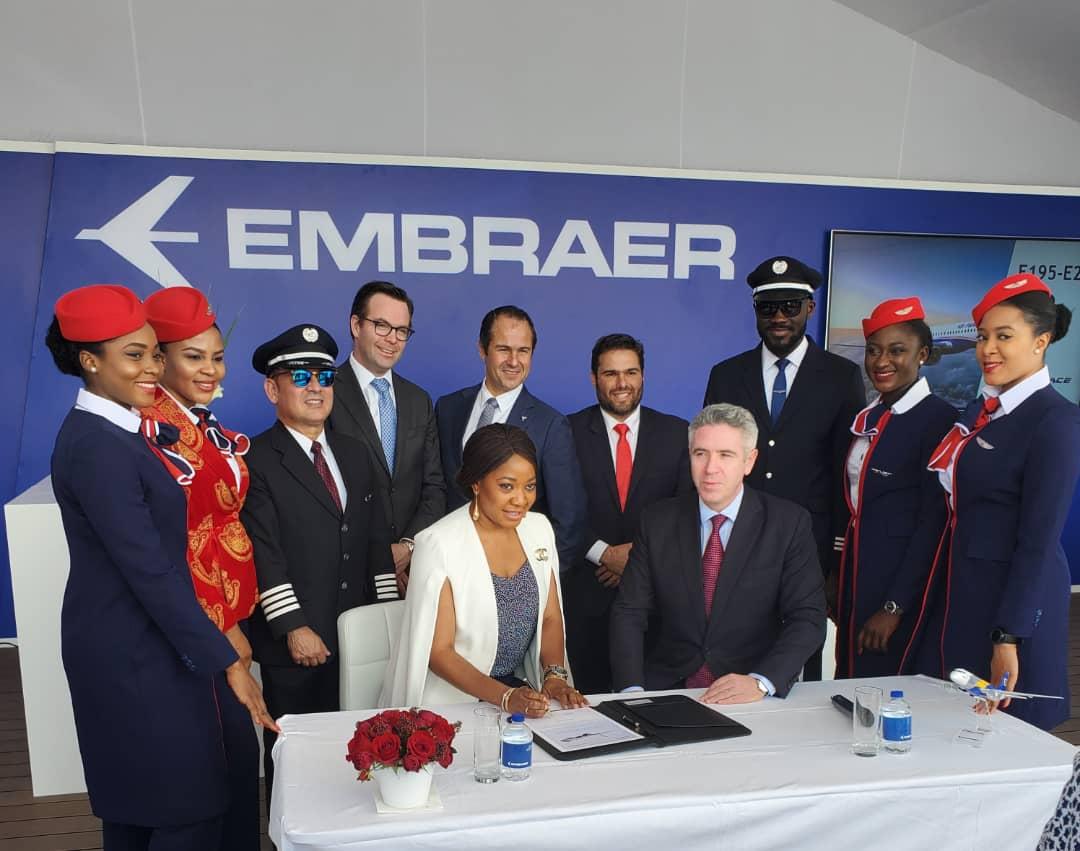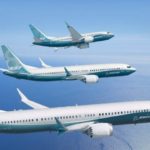
For the first time in many years, Nigerian airlines participated actively in air show by ordering new aircraft, just as other West African carriers
They were two things that were outstanding at the Dubai Air Show that was concluded yesterday.
The Nigerian and West African airlines conspicuously made firm orders. They largely ordered regional and single isle aircraft.
What the orders indicated was that airlines in the sub-region may begin to show their back on classics and may be poised to go for new equipment.
With sensitisation and campaigns, many Nigerian and West African carriers have realised that there is a huge market to tap in the West and Central Africa.
This may be the benefit of the Single African Air Transport Market (SAATM) and the efforts of the International Air Transport Association (IATA), which made it clear that Africa is a huge market if the citizens begin to engage in intra-regional trade.
So the Dubai Air show, which started on November 17 and ended on November 21, was an eye opener for many industry observers in West Africa.
The sub-region has joined others to make firm order for new fleet. It used to happen before in a sporadic way.
Arik Air broke the jinx in 2006 when it ordered for new fleet from Boeing and later from Bombardier and Airbus. Another airline that made positive foray was the defunct Virgin Nigeria Airways, which ordered Embaer jets and two were delivered before the airline went under.
But over the years it has become a tradition among Nigerian carriers to fly Boeing B737 and because they do not have the resources to order new aircraft, they usually go for the classics. Their choice of Boeing jets for average one hour flights, according to technical experts in the industry, does not make economic sense because they spend more money on fuel compared to similar time of flight with Embraer ERJ 145.
But the Managing Director of the Nigerian Airspace Management Agency (NAMA), Captain Fola Akinkuotu, said the reason why Nigerian airlines go for Boeing jets is because Nigerian travelers like to fly above the clouds.
But it seems that Nigerian travelers can fly above the clouds with more fuel-efficient equipment as operators now go for new aircraft.
Air Peace blazed the trail after long interlude when it ordered 10 Boeing 737 MAX and this year it ordered Embraer jets. Also, flying modern Embraer ERJ 145 in its Hopper subsidiary has shown Air Peace that it would safe so much money operating new fleet.
Dubai Air Show
At the Dubai Air Show, Air Peace signed a contract for three additional E195-E2s, confirming purchase rights from the original contract, signed in April this year.
With the new signing at the Dubai Airshow, Air Peace has made total firm order of 13 E195-E2swith 17 purchase rights for the same model, which delivery would begin in May next year.
Air Peace Chief of Finance and Administration, Mrs. Ejiroghene Eghagha who signed the new deal on behalf of the airline explained, “It is our plan to connect the whole Nigerian cities that have airports and burst the triangular routs by connecting flights to direct destinations. Air Peace is looking forward to serving Nigerians with these brand new airplanes and adding more routes to the existing ones for the overall development of our country”.
“We will like to develop new routes to enhance the nation’s economy. We will like to connect Owerri to Kano, Benin to Port Harcourt, Ibadan to some destinations in the northern part of the country. We will also like to connect Sokoto to Maiduguri, Lagos to Gombe. We would connect these cities without stops in Lagos or Abuja.
“We will use our 50-seater Embraer ERJ 145 jets, which we acquired for this purpose. We have just added two of the brand to our existing six, making it eight aircraft. As the new deliveries arrive we utilise the 50-seater jets to connect every city in the country,” Mrs. Eghagha added.
Also Elin Group Nigeria ordered three Dash 8-400 at the cost of $99 million from De Havilland Canada (DHC) set to be delivered in 2020 to airlift oil and gas personnel in and out of airstrips in the Niger Delta.
The aircraft would be supported by Nigerian airline and MRO Company, Aero Contractors, in areas including maintenance, spare parts, and logistics given that the company has been operating various versions of the Dash 8 for almost 30 years.
Elin Group’s managing director Caroline Pritheesh said, “We are in the private charter transport services sector. We’re moving on to improve the efficiency and transport services in international oil companies.
“The Dash 8-400 turboprop has been operating in Nigeria with other carriers and we have seen how this aircraft can support our diverse operational requirements.”
West African Carriers
At the air show Air Senegal signed Memorandum of Understanding (MoU) for eight Airbus A220 aircraft at the 2019 Dubai Air Show. They are expected to receive two aircraft per year from 2021 and would fly them to cities like Lagos, London, and Geneva.
Air Senegal also signed (MoU) for eight of the bigger A220-300 type to be delivered from the end of next year. They are expecting two a year to be delivered from Northern America to the west coast of Northern Africa.
Air Senegal CEO, Mr. Ibrahima Kane said, “These new 220 aircrafts will contribute to develop our long-haul network to Europe and our regional network in Africa. Combined with our recent A330neo aircraft, this new Airbus fleet reveals Air Senegal’s ambition to offer the best travel experience for our passengers.”
“The number of A220s operation on the African continent is steadily growing and we are proud to add Senegal’s new flag carrier in our list of A220 African customers. Offering the lowest operating costs in its category, the A220 is the best aircraft for airlines to launch new domestic and international routes efficiently,” said Chief Commercial Officer Airbus, Christian Scherer in a statement.
It was only Ghana that signed large body aircraft from West Africa at the Dubai Air show. Ghana and Boeing signed a provisional order for three 787-9 Dreamliners.
Ghana said it intends to launch a new airline in which the government would hold a 10 per cent stake and the rest would be held by the private sector.
Ghana also signed a deal with De Havilland Aircraft of Canada for six Dash8-400 aircraft to start its national airline.
Ghana’s plan to reestablish a national flag carrier has been in the works for some time now. The new deal signed by the Aviation Minister Joseph Kofi Addah is expected to further the dream to see a new national airline take to the skies.

Aircraft Type and Trends
THISDAY spoke to industry experts who explained that there are a lot of benefits in operating new fleet.
Director of Research and Strategy of Zenith Travels and member of Aviation Round Table (ART), Olu Ohunayo, commended the airlines for going for new equipment but stressed that they must maximise the utilisation to make money and justify the huge investment.
“It is commendable because this is a country and sub-region that were known to use old, refurbished aircraft and showcased to the public as brand new. It is now easier to discern the old from the new aircraft with modern technology.
“There is a new trend however, in the beginning we thought it was only government owned carriers that order new aircraft, but now it is even the privately owned airlines that are taking the initiative of acquiring new aircraft. This is commendable and this new trend spreads across Nigeria and West Africa.
“So we expect improved performance, new service quality, service delivery and you also expect that the cost of operation, which is a major disadvantage of having older aircraft would drop with the acquisition of new aircraft. Again, having a new aircraft means having deep pocket.
“To acquire new aircraft requires financial maneuvering and negotiation that if not taken care of can affect the airline’s operations. So you need to get financial experts for good advice, who would help in negotiating the terms of payment, which must be favourable to the airline and the aircraft manufacturer,” Ohunayo said.
He remarked that with a new aircraft, the airline is supposed to benefit from modern equipment that enhances safety and other advantage.
“Acquiring new aircraft is commendable. I just hope the airlines can sustain it. Another challenge would be how to maximise the new aircraft for profitability. Besides few carriers, many airlines with new equipment have not been able to justify the investment in their bottom line. This is an area they must work on,” he added.
Synergy
Industry consultant and former Managing Director of Capital Airlines, Amos Akpan said by moving for new fleet, the airlines in the sub-region are gearing up to maximise the gains of a growing intra African market.
“This means the West African sub-region is about to exploit the potential in sociocultural, trade and economic integration. Air transportation is the preferred vehicle for now. Terrorism, banditry and bureaucratic red tapes make road and sea less attractive for distribution of goods and services along the sub-region.
“The development also is a wakeup call to the different aviation authorities in the region to harmonise practices so the companies have a level field to play. The airspace management agencies, the Ghana, and the Nigerian civil aviation control centers need to come together and synergise.
“The handling companies, the travel and tour agencies need to harmonise practices. The airports and the civil aviation authorities should understand that this rebound in airline businesses, aircraft order, and traffic would justify the viability of their existence.
“African Development Bank should see investment funding windows. In all of these potential gains, maintenance repair and overhaul facilities for the west African sub-region is the key to sustainable growth of the airlines because the cost for maintenance of the aircraft they have ordered will impact their finances,” Akpan said.
He also observed that it was a better move by Nigerian airlines to order and operate new aircraft and attain break even payload, which makes economic sense than the current Boeing 737-300/500/800 series that they have been operating.
“I read of orders for Embraer and Dash 8 aircraft. These burn far less fuel per hour. Their break-even payload is between 40 to 50 passengers at the current domestic price per seat per hour. The break-even payload for Boeing 737 is between 88 to 100 passengers per hour flight on the domestic route.
“Then there is the wear and tear on the cycle per sector factor accrued by using Boeing 737-800 for 20 to 50-minute flight frequently. This increases the frequency of maintenance and its associated cost. These factors had effects on the airline’s cost management profile,” Akpan said.
However, he noted that the flip side is that West African passengers carry a lot of baggage and they want their load on same flight, noting that these smaller aircraft will not provide enough space for baggage on the West African routes.
“This is where airline managers need to evolve strategies to accommodate them,” he added.
THISDAY






